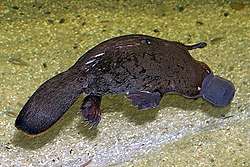platypus
See also: Platypus
English

A platypus
Etymology
From New Latin Platypus (originally a genus name already in use for a type of beetle), from Ancient Greek πλατύπους (platúpous, “flat-footed”), from πλατύς (platús, “flat”) + πούς (poús, “foot”).
Pronunciation
(file) - (Received Pronunciation) IPA(key): /ˈplætɪpəs/
- (General American) IPA(key): /ˈplætɪˌpʊs/, IPA(key): /ˈplætɪpəs/
(file) - Hyphenation: pla‧ty‧pus
Noun
platypus (plural platypuses or platypus or (common, hypercorrect, pseudo-Latin) platypi or (rare, nonstandard) platypodes)
- A semi-aquatic, egg-laying monotreme mammal with a bill resembling that of a duck, that has a mole-like body, a tail resembling that of a beaver, a waterproof pelt, and flat webbed feet — males have poisonous spurs on the inside of the back legs; Ornithorhynchus anatinus
Quotations
- For quotations of use of this term, see Citations:platypus.
Synonyms
Derived terms
Translations
Ornithorhynchus anatinus
|
|
This article is issued from
Wiktionary.
The text is licensed under Creative
Commons - Attribution - Sharealike.
Additional terms may apply for the media files.